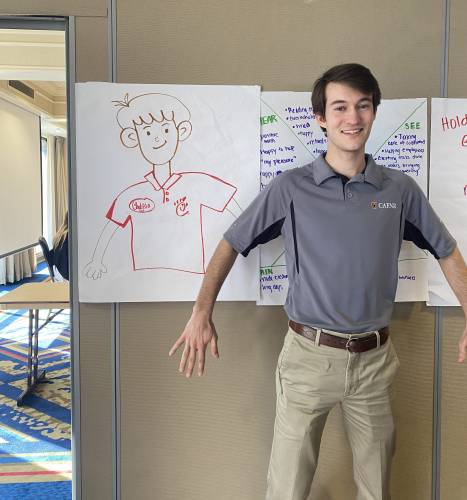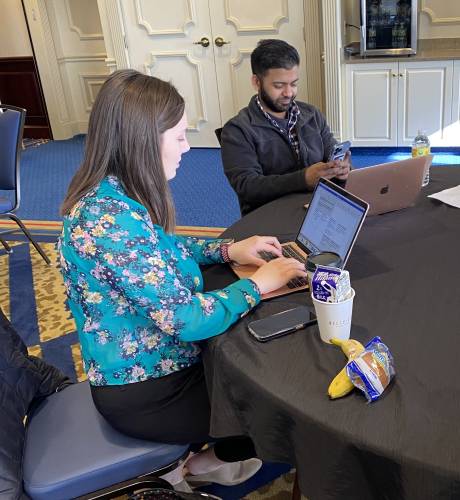The University of Missouri College of Agriculture, Food and Natural Resources (CAFNR) puts a priority on offering its students hands-on learning opportunities. Many of those opportunities come in the courses offered throughout CAFNR’s 14 degree programs.
One of those courses, Designing and Delivering Educational/Leadership Programs (AG_ED_LD 4340), has given students the chance to connect with industry partners and develop educational programs to aid those partners. The class, which includes a collaboration with the University of Illinois Agricultural Leadership, Education and Communication program, pairs students from both universities with an outside stakeholder.
Recently, the students spent a weekend in St. Louis, Mo., to meet in-person and interact with the partners in a face-to-face manner, as well as talk about how to meet the needs of the partners and decide on program deliverables. The event took place at Drury Inn, which was one of the partners.

“I believe that knowledge has to be put into action in order for learning to stick,” said Rebecca Mott, an assistant teaching professor of agricultural education and leadership. “In this course, students first apply concepts to a program they are developing on their own. Then, with this experience under their belts, they are ready to work on a stakeholder project. Students are usually very proud to have these projects to add to their resume, and are excited when stakeholders implement the work that has been done.”
“This has been an invaluable experience – from learning more about Illinois Agriculture in the Classroom to getting hands-on experience in program development to receiving constructive feedback from an experienced professional, this has been a nonstop learning experience that helped me grow as both a student and professional,” added Sage Eichenburch, a senior agriculture major.
Illinois Agriculture in the Classroom is a partnership centered around agriculture, agribusiness and agricultural education that provides Illinois educators and students with the resources to help them understand the role of the agriculture sector in their lives. Eichenburch has worked with a Mizzou classmate and two students from Illinois to develop two posters that can be distributed to third to eighth grade classrooms throughout Illinois. Their goal was to make soil exciting.
“As a sustainable agriculture student, I have spent the past four years discussing the importance of soil health in class, as well as methods for improving the soil,” Eichenburch said. “These posters are part of a campaign to educate youth about soil science and the importance of building healthy soils. The first poster covered the basics of soil science, using fun graphics to explain vocabulary and help kids visualize soil structure. The second poster is all about composting and how kids can start a composting program at their home or school.”
Along with Illinois Agriculture in the Classroom and Drury Inn, other partners include the Danforth Foundation, Council for Agricultural Science and Technology (CAST), Illinois 4-H, Missouri Agriculture Education on the Move, and Chick-fil-A. Students heard from each of those partners during the in-person meeting. They were then paired with a partner to begin the process of developing programs.
“Being involved in the program launch weekend was a unique experience,” Eichenburch said. “Alongside my classmates, I had the chance to hear from and work with professionals from a variety of backgrounds in a wide variety of fields. From all their individual experiences and advice, I think our class got a realistic look into the world beyond the classroom. Working with these stakeholders helped me think about topics from new angles and was overall an exceedingly important experience for which I am quite thankful.”

Sydney Baxter, a senior agricultural education student, was paired with Drury Inn. Baxter said her team was able to talk with Drury Inn employees, tour the kitchen and observe what happens during breakfast at the hotel.
“Dr. Mott actually placed me with the Drury Inn group,” Baxter said. “The great thing about her is that she understands exactly which situation fits our strengths. She knew that’s what I needed and it turned out to be a great experience. We were able to dive into the data that Drury Inn provided and important real-world, hands-on experiences.”
Mott worked with Amy Leman, assistant research professor at the University of Illinois, to make the course a reality. They applied for and received an Innovative Teaching Award from the Association of Public and Land-grant Universities’ (APLU) Board on Agriculture Assembly’s Academic Programs Section.
“What we’ve learned in this class is very relevant to what I want to do with my future,” Baxter said. “It’s so exciting to be able to take a class that I can apply to my life. I’m really interested in education and personal development, and I’ve learned so much that will prepare me for the future.”
As the students finish up the course, they will present the educational programs to the various partners.
“It has a been a great chance for me to branch out and work with students from outside my major; I think I’ve learned a lot from them and hopefully helped them learn a bit about sustainable agriculture,” Eichenburch said. “The hands-on portion of the class has been exceedingly important as it has allowed me to apply what I have learned in the classroom to see what works and what I need to improve upon. I believe that having a hands-on experience like this class has provided is a great way to prepare students for a professional environment and develops skills and abilities in a unique way.”